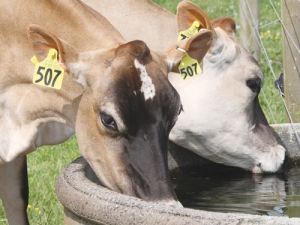New approach takes on Staph
A runny nose and fever can be caused by the flu, Covid, an allergy, or something completely different. Sometimes infected people have no symptoms.
 The consumer can't be there to see how clean your shed so it makes sense to reduce risks to human health from nasties such as E. coli in water.
The consumer can't be there to see how clean your shed so it makes sense to reduce risks to human health from nasties such as E. coli in water.
Imagine you are new on a property and your dairy inspector has tested your farm dairy water and placed you on temporary water exclusion, or perhaps you have been on water exclusion for years.
Monthly fines are adding up; you know you have to do something about it, but what? Or maybe you've tried but have failed your test?
A sustainable solution to your water quality issues may begin with revamping how you collect and store water for the house, dairy shed and stock, but where do you start?
It's worth getting it right; failure to comply means more monthly fines and retesting costs. You can't make a 'sow's ear into a silk purse' and shortcuts or tricks will cause you to fall short of what's required and force you to revisit the problems. Also, the extension of penalty reimbursements makes this a great time to sort things out: you may be able to do it more easily than you think.
MPI demands that water meets farm dairy water standards because of food safety imperatives. Your water may fail because of E. coli (bacteria from the poo of warm blooded animals) clarity/turbidity (haze, sediment or cloudiness in the water) or colour (could be from leaves and dirt in streams or iron in water).
In some cases your water source is considered a risk (due to open surface water takes or water from natural sources such as rain, streams, or dams, even where no E coli is found).
For many years you have got away with some aspects and the fines imposed have meant it was cheaper and easier to pay fines than to fix problems.
But the sustainability of NZ as a world class dairy producer – making a premium product used in human (including baby) foods from water containing bacteria found in human poo (eg E. coli) – should be numbered. This issue is like those faced by grubby food take-aways and restaurants. The consumer can't be there to see how clean your shed so it makes sense to reduce risks to human health from nasties such as E. coli in water.
Remedial factors
Consider each factor to help in your water exclusion remediation.
Hidden costs
• The authors work for Farm Medix Ltd
Federated Farmers president Wayne Langford is claiming “some real success” on the 12 policy priorities it placed before the Coalition Government.
Federated Farmers is throwing its support behind the Fast-track Approvals Bill introduced by the Coalition Government to enable a fast-track decision-making process for infrastructure and development projects.
The latest report from ANZ isn’t good news for sheep farmers: lamb returns are forecast to remain low.
Divine table grapes that herald the start of a brand-new industry in Hawke’s Bay have been coming off vines in Maraekakaho.
In what appears to be a casualty of the downturn in the agricultural sector, a well-known machinery brand is now in the hands of liquidators and owing creditors $6.6 million.
One of New Zealand’s deepest breeder Jersey herds – known for its enduring connection through cattle with the UK’s longest reigning monarch, Queen Elizabeth II – will host its 75th anniversary celebration sale on-farm on April 22.
OPINION: Talking about plant-based food: “Chicken-free chicken” start-up Sunfed has had its valuation slashed to zero by major investor Blackbird…
OPINION: Synlait's financial woes won’t be going away anytime soon.